新概念lesson121-122_课件_笔记
新概念第一册第121-122课精品课件

b. 在从句中担任句子成分:主语或宾语
c. 做连词,把主句和从句连接起来
I love singers who write music.
练习:判断who/that 在从句中担任主语还是宾语。
I
love singers who write their own songs
主语
He I I
is the man who I met yesterday.
5.当先行词同时包括人或物时。 We often talk about the people and the things that we are interested in. 6.当主句是who或which时。 Who is the girl that has black long hair? Which is the pen that you bought?
Look at the girl ____name is Lucy. A. who B. that C. who’s D. whose
只用that的情况
1.当序数词或形容词最高级修饰先行词时。
Tom is the cleverest boy that I have ever known.
6.Who is the girl _______is that standing under the tree?
3.当先行词被all, little, few,much,any,every,no 等修饰时 I have eaten all the food that is left. 4. 当先行词是There be 句型中的主语且指物 时。 There is little work that is fit for you. 没有什么工作适合你做。
新概念课堂笔记第一册Lesson121-122

新观点英语讲堂笔录第一册Lesson 121-122Word Studycustomer【用法】 n. 客【展】 custom n. 俗,例;customs n. 海关customs officer海关官forget【用法】 vt. 忘(forgot - forgotten)【】 forget sb./sth. 忘某人 /某物forget to do sth. 忘去做某事forget doing sth.忘做某事forget + 疑+ to do【例句】 I forgot her telephone number.我忘了她的号Don ’t forget to lock the door before you leave home. 离家前忘了。
I ’ ll never forget seeing the opera in Beijing. 我永也忘不了在北京看的那歌。
I forget how to spell this word. 我忘了怎样拼写个。
【反】 remember v. 得manager【用法】 n. 理【展】 manage v. 管理【构】 manage + -er →manager【】 manager to do sth. 法做成某事serve【用法】 v. ○1服,招待;服侍○2供;出(食品或料等)○3⋯⋯服 /服役;任【】 serve the people 人民服serve as 充任,担当;【展】 service n. 服servant n. 仆人【例句】 The shop owner hurried to serve her. 店东赶去招待她。
A young waiter served them. 一位年的侍从服侍他餐。
Serve it to the ladies first.把它先端女士。
The hotel serves breakfast at 7 a.m. every morning. 个店每日清晨 7 点供早。
新概念英语NCE1_lesson121-122(共27页)课件

• CUSTOMER: I bought two expensive dictionaries here half and hour ago, but I forgot to take them with me.
• MANAGER: Who served you, sir? • CUSTOMER: The lady who is standing behind the counter. • MANAGER: Which books did you buy? • CUSTOMER: The books which are on the counter. • MANAGER: Did you serve this gentleman half an hour ago,
邮件还没发) • ②I forget sending an email to him.(忘记已经发过
了,邮件已经发出了)
• 3.serve :[sə:v] v. • (1)服务;接待;侍候:
• Are you being served, sir? • 先生,有人为您服务吗?
• A young waiter served them. • 一位年轻的侍者侍候他们进餐。 • (2)供给;摆出(食物或饮料等):
• 2.put it on,戴上它。
• 这里的 it指 a hat,以避免重复。 put on是“戴上”、“穿上”的意思。 假如它的宾语是一个名词,这个名词 可放在 put on之后,也可放在put和on 之间。假如是代词,就必须放在put和 on 之间。如:
• Put on your coat./Put your coat on. 穿 上外衣。但只能说:Put it on. 把它穿 上。
• What time is breakfast served in this hotel? • 这个饭店里什么时候供给早餐?
Lesson121-122(课件)新概念英语第一册
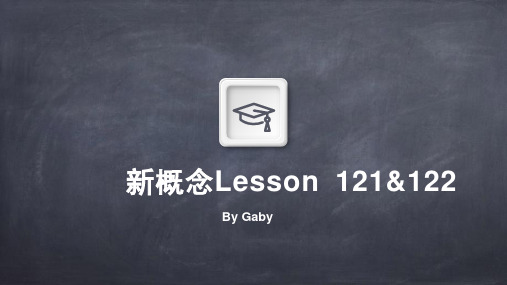
7. road [rəud] n.路 on the road 在路上 in the street 在大街上
1.The man in a hat (定语后置) in + 服装 ——穿着/ 戴着 in the white shirt - 穿着白衬衫 定语:“的” (修饰名词或者代词) a. 什么可以作定语:形容词: a pretty girl
1. customer ['kʌstəmə] n.顾客 sales assistant 销售员/ waiter 服务员 / waitress 女服务员 The customer is always right. 顾客至上
2. forget [fə'get] v.忘记 (forgot /fə'gɔt/, forgotten/fə'gɔtn/) forget to do sth 忘记要做...... e.g. I forget to finish my homework. (忘记做,还没做) forget doing sth 忘记已经做过...... e.g. I forget finishing my homework. (忘记已经做了,做过了。)
3. manager ['mænidʒə] n.经理 v. manage 管理 e.g. manage people 人事管理
4. serve [sə:v] v.照应,服务,接待 一位年轻的服务员侍候他们进餐。 A young waiter served them. n. service 服务 那家餐馆的服务很差。 The service in that restaurant is not good/bad/poor.
新概念Lesson 121&122
新概念英语第一册 Lesson121-122 (共28张PPT)

营业员和顾客 _s_h_o_p_a_s_si_s_ta_n_t_a_n_d_c_u_s_to_m__er___ regular customer __经_常__光_顾__的__客_人______
Vocabulary
(2). forget v. 忘记 (forget - _f_o_r_g_ot__ - _f_o_r_go_t_t_e_n_) 结构:forget to do sth. _忘__记_去__做__某_事__(还__没__做_)__
forget doing sth. _忘__记_做__过__某_事__(做__过_了__)__
e.g. I have forgotten _t_o_b_r_in_g__ my book.(bring) I will never forget __fi_n_d_in_g_ that rare coin in
你能开一下窗吗?
Sentences
put on 穿上,文中的it指代 ___衣_服__. 辨析:wear_穿_着__(_强_调__状_态__) V .S. put on _穿_上__(强__调__动_作__)
试一试:选词填空: I like to __w_e_a_r_ the hat every day. Please __pu_t_o_n_ your shoes. It is so untidy here.
定语从句练习:教材 P248 句型练习,注意连接词的运用
试一试 3: Neil and Yoyo are walking on the playground. They see many interesting people and things there.
新概念英语第一册121-122课课件

• • • •
recognize v. 1) 认出 你能认出他的笔迹吗? Do you recognize his handwriting?
• 2)承认(事实),认清,确认 他不承认自己犯下了大错。 • He didn’t recognize that he had made a big mistake.
• Who served you, sir? • The lady who is standing behind the counter. • served是serve的过去式,“服务”
• • • •
Which books did you buy? which 指在一定范围内的哪个(些) which 既可用来指人,又可用来指物 Did you serve this gentleman half an hour ago, Caroline? • He says he’s the man who bought these books.
• take sth with sb 把某物带走 • 我去那个村庄的时候我随身带了一些药。 • I took some medicine with me when I went to the village. • take sb sth = take sth to sb • 把某物拿去给某人 • 我将给我在北京的朋友们带一些礼物。 • I’ll take some presents to my friends in Beijing. • = I’ll take my friends in Beijing some presents.
定语从句
• 定义:在复合句中修饰名词和代词的从句 叫做定语从句。
• 被定语从句修饰的名词或代词是先行词。 定语从句必须放在先行词之后。 • The student who answered the question was peter. • 回答问题的那个学生叫Peter.
新概念英语第一册第121-122课分解

❖ After self-reading, read the conversation loudly following CD.
Revision: Lesson121 The man in a hat Text
= I’ll take my friends in Beijing some presents.
Key words&expressions
2. forget [fə‘get] v.忘记(forgot/ forgotten) ❖ forget to do sth 忘记要做某事 ❖ forget doing sth 忘记已经做过某事
大家感受一下这两个句子: ❖ ①I forget to send an email to him. (忘记要发邮件,邮件还没发) ❖ ②I forget sending an email to him.(忘记已经发过了,邮件已经发
❖ manage ['mæ nid3] v. 管理
❖ manage a company 经营公司
Key words&expressions
4.serve [sə:v] v.
❖ (1)服务;接待;侍候: ❖ Are you being served, sir? 先生,有人为您服务吗? ❖ (2)供给;摆出(食物或饮料等):
❖ customer ❖ forget ❖ manager ❖ serve
❖ counter ❖ recognize
n. 顾客 v. 忘记 n. 经理 v. 照应,服务,
接待 n. 柜台 v. 认出
cards game
裕兴新概念第一册笔记(121-122)
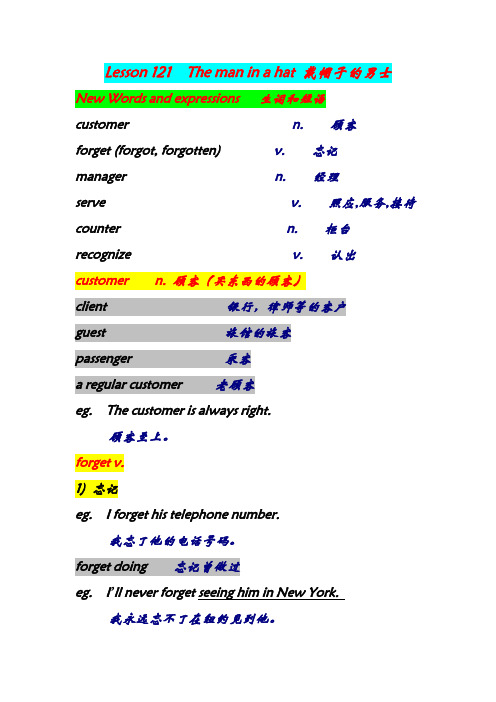
Lesson 121 The man in a hat 戴帽子的男士New Words and expressions 生词和短语customer n. 顾客forget (forgot, forgotten) v. 忘记manager n. 经理serve v. 照应,服务,接待counter n. 柜台recognize v. 认出customer n. 顾客(买东西的顾客)client 银行,律师等的客户guest 旅馆的旅客passenger 乘客a regular customer 老顾客eg. The customer is always right.顾客至上。
forget v.1) 忘记eg. I forget his telephone number.我忘了他的电话号码。
forget doing 忘记曾做过eg. I’ll never forget seeing him in New York.我永远忘不了在纽约见到他。
forget to do 忘记做(to do 表示将来的动作)eg. Don’t forget to call me.别忘了打电话给我。
She forgot to mail the letter.她忘了寄信2) 忘记带(买,做)eg. I forgot my umbrella.我忘了带伞。
He forgot his umbrella on the train,=He left his umbrella on the train.他将伞忘在火车上。
manager n. 经理a sales manager 销售经理manage v. 管理manage a firm 经营公司serve v. 照应,服务,接待eg. How can we serve you?(营业员对顾客用语)需要我们为你服务吗?serve sb right (口语) 给某人应得的报应(惩罚)eg. Serve him right.=It serves him right!他活该service n.eg. The service in that restaurant in poor.那家餐馆的服务很差。
新概念英语NCE1_lesson121-122(共51页)课件

③ v. 指挥;指责 They charged her with murder.
Question
What does Ann advise her husband to do next time?
数阅
学读
使使
人人
精充
细实
;;
博会
物谈
使使
人人
深敏
沉捷
;;
You made my day!
伦 理 使 人 庄 重 ; 逻 辑 与 修 辞 使 人 善 辩 。
如后面跟进行时则表示对过去正在进行的动作的猜测。 He can’t have been reading. He must have been sleeping.
Question
Who is only twenty-nine, and why is it so unclear?
Lesson 129 Seventy miles an hour
Question Does Susan have tea by herself?
Lesson 127 A famous actress
famous fame n. ① adj. 著名的;出名的
She’s a very famous actress. be famous for
She is famous for her beauty. be famous as
新概念英语Lesson121-122笔记

Lesson121-122Wordsserve v.照应,服务,接待service n.服务recognize v.认出(指之前就认识,只是在某种情况下没有认出来)Grammar(定语从句)定语:形容词修饰名词,形容词作定语(adj.+n.) e.g. a pretty girl定语从句:用句子代替词修饰一个名词,且放在名词之后的句子。
也叫做形容词性从句。
e.g.She is a girl who is pretty.引导词:即关系代词(who,what,which,that)和关系副词(where,when)(1)who/that谈论人e.g. The lady who/that is standing behind the counter served me.(那位站在柜台后面的女士服务过我,重点是女士服务过我,而不是女士在柜台后。
)The lady served me是主句,划线部分是定语从句,紧跟在先行词(即所修饰的名词)lady之后。
who或者that都可以,但是不能省略。
(2)which/thate.g. I bought the books which/that are on the counter.(我买了柜台上的那些书,重点是我买了那些书,而不是书在柜台上。
)I bought the books是主句,划线部分是定语从句,紧跟在先行词(即所修饰的名词)books之后。
注意:大家在做题和阅读的时候要注意分析句子成分,准确翻译句子。
what谈论事件,where谈论地点,when谈论时间。
Textthe man in a hat 戴帽子的男士(in不是在里面,而是穿着)e.g. the one in white穿白衣服的人write to 写信,不需要再加a letter。
新概念英语第一册121-122课课件.ppt

单词学习
• customer • forget • manager • serve • counter • recognize
n. 顾客 v. 忘记 n. 经理 v. 照应,服务,接待 n. 柜台 v. 认出
• customer n. 顾客(买东西的顾客) • client 银行,律师等的客户 • guest 旅馆的旅客 • passenger 乘客 • a regular customer 老顾客 • 顾客至上。
• serve v. 照应,服务,接待 • 一位年轻的侍者侍候他们进餐 • A young waiter served them. • serve sb right (口语) • 给某人应得的报应(惩罚) • 他活该
• Serve him right.= It serves him right!
• service n. • 那家餐馆的服务很差。
定语从句
• 定义:在复合句中修饰名词和代词的从句 叫做定语从句。
• 被定语从句修饰的名词或代词是先行词。 定语从句必须放在先行词之后。
• The student who answered the question was peter.
• 回答问题的那个学生叫Peter.
• 用作关联词的关系代词有who, whom, whose, that, which 等。
课文讲解
• I bought two expensive dictionaries here half an hour ago, but I forgot to take them with me.
• half an hour ago 半小时之前(用在过去时 当中)
新概念英语第一册第121-122课课件
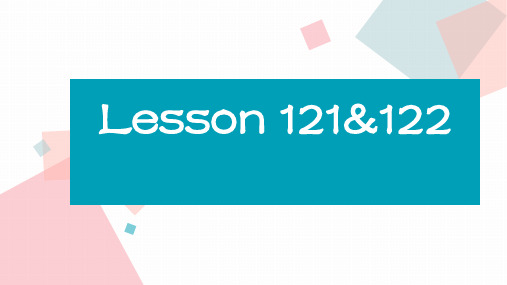
wear v.
戴牙套 wear a brace on her teeth 戴眼镜 wear a pair of glasses 戴帽子 wear a hat
forget to do something 忘记要做某事
take sth. with sb.
把某物随身带着/拿着
serve sb.
接待某人
I eat my breakfast at…
hurry up 赶快 be late (for…) (…)迟到
Don’t be late for school again! 上学别再迟到了。
Don’t be late for work again! 上班别再迟到了。
Is Lily late for school? Yes, she is。
Lesson 121&122
Review
It’s twelve o’clock.
It’s half past six.
It’s eleven o’clock.
It’s half past one.
get up 起床
What time does Lily get up? She gets up _a_t__se__v_e_n__o_’_c_l_o_c_k. Q: What time do you get up every day?
Which books did you buy?
The books which are on the counter.
Manager: Did you serve this gentleman half an hour ago, Caroline? He says he’s the man.
Caroline: I can’t remember. The man was wearing a hat. Manager: Have you got a hat, sir? Customer: Yes, I have. Manager: Would you put it on, please? Customer: All right. Manager: Is this the man, Caroline? Caroline: Yes. I recognize him now.
新概念第一册 lesson121-122(PPT共58页)

whom 指人,在句子中做宾语,不能做主语,
常可省略。
❖The man (whom) you met just now is my father.
❖The woman (whom) she is talking with is my sister.
This is the computer which I bought three days ago. This is the television which I bought a month ago.
He is the man who came here last week. She is a nurse who looked after me.
• 在复合句中,修饰名词或代词的从句叫定 语从句,定语从句相当形容词的作用在句 中作定语。“……的”
先行词 关系词
The man who I served was wearing a hat.
定语从句 主句
that指人或物, 在从句中做主语或宾语, 作宾语时可以省略
They’re talking about the film.
• He is our manager.
• They managed to finish the task. • manage to do sth. 成功的做了某事
• 他做园艺工人。 • He served as a gardener.
recognize v.认识
• 我现在认出他来了。 • I recognize him now.
whose 指人或物,在从句中作定语。先行词与
新概念1 Lesson121-122
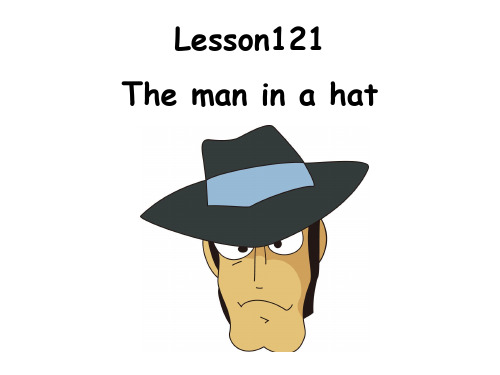
Practice: P248 A She is the girl. She met me yesterday. She is the girl who met me yesterday. This is the book. I bought it yesterday. This is the book which I bought yesterday. She is the girl. I met her yesterday. She is the girl who/whom I met yesterday.
Caroline? He says he’s the man who bought these books. CAROLINE: I can’t remember. The man who I served was wearing a hat. MANAGER: Have you got a hat, sir? CUSTOMER: Yes, I have. MANAGER: Would you put it on, please? CUSTOMER: All right. MANAGER: Is this the man that you served, Caroline? CAROLINE: Yes. I recognize him now.
•The man who/that is standing behind the counter. •The woman who/that is standing behind the counter. •The men who/ that are repairing the road.
新概念第一册 Lesson121-122(共24张PPT)

which. that 用来指物
用作主语、宾语,作宾语时可以省略,例如: ①The cups (which / that) are on the shelf are pretty. (which / that在从句中作主语) ②He has found the key (which / that) he lost yesterday. (which / that在从句中作宾语)
定义:在复合句中修饰名词和代词的从句叫做定语从句。 被定语从句修饰的名词或代词是先行词。 定语从句必须放在先行词之后。 定语从句要由关联词:关系代词who, whom, that,which或关系 副词when, where等引导。 eg:The student who answered the question was peter.
Homework
COVID-19
少出门 多通风 勤洗手 戴口罩
1. To finish the exercises after the text. 2. To practise the structures learned during the class.
Language focus
4. Would you put it on, please? All right. Would you ... please? 表示提出客气的请求,相同表达方式还包括: Could you ... please? eg:Would you open the window, please? All right = OK. 表示“好吧,行”也可表示(身体)好,无恙 That's all right. “没有关系”,用于回答sorry That's all. “就这些了” That's right. “对了,说得对”
新概念英语第一册Lesson-121-122(共26张PPT)
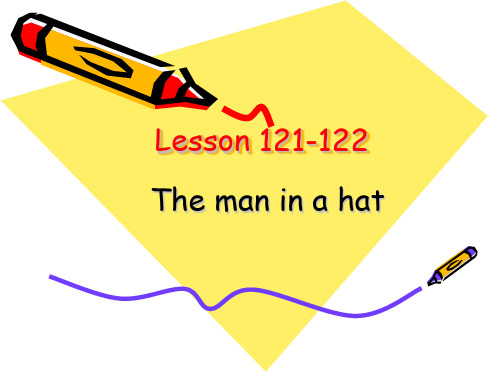
Manager: Did you serve this gentleman half an hour ago, Caroline?He says he’s the man who bought these books.
Caroline: I can’t remember. The man who I served was wearing a hat.
served, Caroline? Caroline: Yes. I recognize him now.
expensive adj.
costly ,dear e.g. He bought his wife a costly
diamond necklace. That is a dear shop.
Manager: Have you got a hat, sir? Customer: Yes, I have. Manager: Would you put it on, please? Customer: All right. Manager: Is this the man that you
wear v.
wear a brace on her teeth 戴牙套
wear a strange pair of shoes wear a hat to guard your face against the
sun
Important phrases
forget to do something 忘记要做某事
antecedent 先行词
• 被定语从句修饰的名词、代词称为先行 词。如“The man”、“The book”。 如“那个穿着西装的人是我爸爸”这就 是一个定语从句。
• The man who wears the suit is my dad.
新概念一Lesson121-122The man in a hat ppt课件
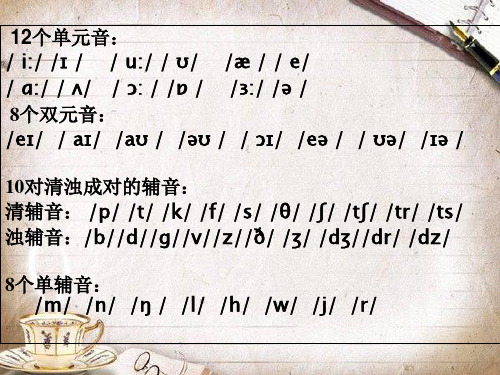
主谓 宾
(是一个完整的句子)
定
例如: This is the man who came here last week. 引导词:who(指人。主语) 被修饰词:the man 翻译:这就是上周来这儿的那个人。
This is the book which I bought yesterday. 引导词: which(指物) 被修饰词:the book 翻译:这就是我昨天买的书。
Heaven helps those who help themselves.
天助自助者。
Lesson121 戴帽子的男士
CUSTOMER: 我买了两本很贵的字典 (expensive dictionaries )--在这里 -半小时前(half an hour ago), 但是我 忘记(forgot to )把他们拿走了。
ago, but I forgot to take them with me.
MANGER: Who served you, sir?
CUSTOMER: The lady who is standing behind the counter.
MANGER: Which books did you buy? CUSTOMER: The books which are on
MANGER: 谁接待您的,先生?
Heaven helps those who help themselves.
天助自助者。
Hale Waihona Puke CUSTOMER: 那个女士-- 站在柜台后 的那位.
MANGER: 您买的是什么书? CUSTOMER: 就是柜台上的两本书。
Heaven helps those who help themselves.
- 1、下载文档前请自行甄别文档内容的完整性,平台不提供额外的编辑、内容补充、找答案等附加服务。
- 2、"仅部分预览"的文档,不可在线预览部分如存在完整性等问题,可反馈申请退款(可完整预览的文档不适用该条件!)。
- 3、如文档侵犯您的权益,请联系客服反馈,我们会尽快为您处理(人工客服工作时间:9:00-18:30)。
新概念英语一lesson 121122 课件笔记学员:王晨晨教师:李军力•1、Custome r ['kʌstəmə] n、顾客•custom 风俗•customs 海关•有顾客customer得地方,肯定就有shop assistant /waiter/waitress •Customer is god、2.serve :[sə:v] v、•(1)服务;接待;侍候:~ a master 服侍主人•Are you being served, sir? 先生,有人为您服务吗?•(2)供给;摆出(食物或饮料等):Dinner is ~d、晚餐准备好了She served me a cup of coffee、她给我端上一杯咖啡。
•(3)为……服务/服役;任职:~ mankind为人类服务serve the people 为人民服务to serve in the Army / navy / air force 在陆军/ 海军/ 空军服役•3、forget [fə‘get] v、忘记(forgot/ forgotten)•forget to do 忘记要做…•forget doing sth 忘记已经做过…•大家感受一下这两个句子:•①I forget to send an email to him、(忘记要发邮件,邮件还没发) •②I forget sending an email to him、(忘记已经发过了,邮件已经发出了)4、counter[‘kauntə] n、[C]柜台•on the counter•I bought the watch at the counter、这只表就是我在这个柜买得。
•5、manager[‘mænɪdʒə] n、[C] 经理•He is a store manager、她就是一位商店得经理。
•6、recognize v、1)认出,认识I recognized her by her red hat、我根据她得红色帽子认出了她、The policeman recognized her as a pickpocket、警察认出她就是个小偷。
2)承认,确认~ defeat承认失败The United States recognized the People's Republic of China at last、美国最终承认了中华人民共与国。
They recognized Lucy as his lawful heir、她们确认lucy为她得合法继承人Text analysis and grammar focus•1.…but I forgot to take them with me、……但就是我忘了拿走。
forget to do sth、表示“忘了做某事”,them指两本字典。
take sth、with sb、某人带(拿)着某物•2.put it on,戴上它。
这里得it指a hat,以避免重复。
put on就是“戴上”、“穿上”得意思。
假如它得宾语就是一个名词,这个名词可放在put on之后,也可放在put与on之间。
假如就是代词,就必须放在put与on 之间。
如: •Put on your coat、/Put your coat on、穿上外衣。
但只能说:Put it on、把它穿上。
3、All rightAll right=OK、表示“好吧,行”也可表示(身体)好,无恙That’s all right、表示“没有关系”,用于回答sorry、That’s all、表示“就这些了”。
That’s right、表示“对了,说得对”。
Text analysis and grammar focus定语从句•概念:在复合句中,修饰某一名词或代词得从句叫做定语从句、被修饰得名词或代词叫做先行词,定语从句一般放在先行词得后面、定语从句要由关系代词who, whom, that,which, whose或关系副词when, where等引导。
注:关系代词有主语、宾语之分。
一般whom作为宾语。
关系代词在从句中作主语,宾语,表语,定语等,关系副词在从句中作地点状语,时间状语,原因状语等。
关系代词所代替得先行词就是人或物得名词或代词,并在从句中充当主语、宾语、定语等成分。
关系代词在定语从句中作主语时,从句谓语动词得人称与数要与先行词保持一致。
1、that 既可以用于指人,也可以用于指物。
在从句中作主语或宾语,在从句中作主语时不可省略,在从句中作宾语可省略。
Mary likes music that is quiet and gentle、玛丽喜欢轻柔得音乐。
(that作主语,不能省略)The coat (that) I put on the desk is blue、我放在桌子上得那件外套就是蓝色得。
(that作宾语,可以省略)2、which用于指物,,在从句中作主语或宾语,在从句中作主语时不可省略,在从句中作宾语可省略。
The building which stands near the train station is a supermarket、位于火车站附近得那座大楼就是一家超市。
(作主语,不能省略)The film (which) we saw last night was wonderful、我们昨天晚上瞧得那部电影很好瞧。
(作宾语,可以省略)3、who, whom用于指人,who 用作主语,whom用作宾语。
在口语中,在从句中作宾语时有时可用who代替whom,也可省略。
The girl who often helps me with my English is from England、经常在英语方面帮助我得那个女孩就是英国人。
(作主语,不能省略)Who is the teacher (whom / who) Li Ming is talking to?正在与李明谈话得老师就是谁?(作宾语,可以省略)也就就是说,关系代词在从句中作宾语时,可以省略4、 Whose 用来指人或物, 表所有(只用作定语, 若指物,它还可以同of which互换,指人得时候也可以用of whom 代替)He has a friend whose father is a doctor、她有一个朋友得父亲就是医生、(1) They rushed over to help the man whose car had broken down、那人车坏了,大家都跑过去帮忙。
(2) Please pass me the book whose (of which) color is green、请递给我那本绿皮得书。
注意:(1)当定语从句中含有介词,介词放在句末时,who, that, which可省略,但介词在关系代词前时,关系代词不可省略,只能用“介词+which/whom”结构。
This is the house (which) we lived in last year、这就是我们去年居住得房子。
=This is the house in which we lived last year、The person (whom) you just talked to is Mr、Li、刚刚与您说话得人就是李先生。
= The person to whom you just talked is Mr、Li、(2)介词若与从句中得动词词组有关,可前置于关系代词前,也可置于动词后,但若此介词与动词为固定词组,则此介词一般不前置。
Yesterday we paid a visit to the house in which Lu Xun lived、=Yesterday we paid a visit to the house which Lu Xun lived in、昨天,我们参观了鲁迅得故居。
This is the very pen that I'm look for、那就就是我正在找得那支钢笔。
(look for为固定词组,则介词for不可前置。
)This is the person whom you are looking for、这就就是您要找得那个人。
(3)that 作介词得宾语时,介词不能放它得前面,只能放在从句中动词得后面。
The city that she lives in is very far away、她居住得城市非常远关系词只能用that得情况:a.先行词被序数词或形容词最高级所修饰,或本身就是序数词、基数词、形容词最高级时,只能用that,而不用which、He was the first person that passed the exam、她就是第一个通过考试得人。
b、先行词为all、any、much、many、everything、anything、none、the one等不定代词时,只能用that,而不用which、(如果就是指代人得不定代词,依然可以用who)Is there anything that you want to buy in the shop?您在商店里有什么东西要买吗?c、先行词被the only, the very, the same, the last, little, few 等词修饰时,只能用that,而不用which、This is the same bike that I lost、这就就是我丢得那辆自行车。
d、先行词里同时含有人或物时,只能用that, 而不用which、I can remember well the persons and some pictures that I saw in the room、我能清楚记得我在那个房间所见到得人与一些照片。
e、以who或which引导得特殊疑问句,为避免重复,只能用that、Who is the girl that is crying?正在哭泣得那个女孩就是谁?f、主句就是there be 结构,修饰主语得定语从句用that,而不用which、There is a book on the desk that belongs to Tom、桌子上那本书就是汤姆得。
关系词只能用which,而不用that 得情况:a、先行词为that, those时,用which, 而不用that、What’s that which is under the desk?在桌子底下得那些东西就是什么?b、关系代词前有介词时,一般用which,而不用that、This is the room in which he lives、这就是她居住得房间。
